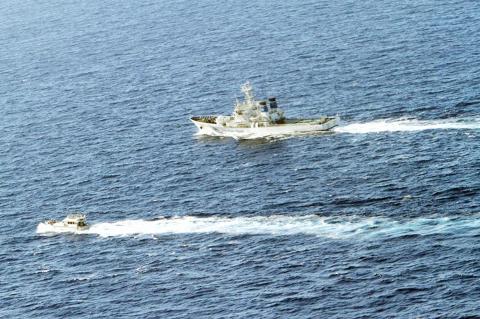A Taiwanese fishing boat, escorted by five coast guard vessels, yesterday approached to within 0.4 nautical miles (740m) of the Diaoyutai Islands (釣魚台), in the largest flare-up in tensions over the islets since since 2008.
Japanese Chief Cabinet Secretary Osamu Fujimura condemned the act at a press conference yesterday morning, saying that under no circumstances and for no reason are Taiwanese activists allowed to enter the waters surrounding the Senkaku Islands, the Japanese term for the Diaoyutai Islands, Japan’s Sankei Shimbun reported yesterday.
The Sankei Shimbun reported that an information contact point under a Cabinet crisis management center had been set up at Japanese Prime Minister Yoshihiko Noda’s official residence to monitor the situation.

Photo: AFP
The Interchange Association, Japan, which represents Japan in Taipei, registered its protest with the Ministry of Foreign Affairs’ East Asian Relations Commission.
Hsieh Ching-chin (謝慶欽), an official at the Coast Guard Administration in Taipei, said last night that it was the strongest protest the Japanese government has made over the territorial dispute since 2008.
The last time a Japanese chief Cabinet secretary made an official complaint was on June 16, 2008, when Taiwanese activists came within 0.4 nautical miles of the island, the closest Taiwanese activists have ever come to the Diaoyutai Islands, Hsieh said.
The June 16 event occurred five days after Japan arrested a Taiwanese fishing boat captain following a collision near the islands, he said.
In Taipei, the government adopted a relatively low-key approach.
Executive Yuan spokesperson Hu Yu-wei (胡幼偉) declined to comment, saying the question should be referred to the Ministry of Foreign Affairs.
Keelung City Coast Guard unit captain Chen Sih-chuan (陳泗川), who was in charge of protecting the Taiwanese fishing boat, called a press conference at 5:30pm to explain the mission.
Chen said that coast guard personnel prevented Japanese maritime authorities from boarding a Taiwanese fishing boat at 8:57am and a patrol vessel had a minor collision with a Japanese patrol vessel at 11:46am on their way back to Keelung.
The fishing boat, with nine people on board — three activists, three sailors and three fishermen — set sail at 11:34pm on Thursday night and the coast guard dispatched five vessels to escort the fishing boat at about 8:25am, Chen said.
Chen said the fishing boat, surrounded by five patrol vessels, started to return at 9:02am, while Japanese patrol vessels followed them until the collision occurred.
“We conducted the mission to protect Taiwan’s sovereignty and its fishing boats, and maintain a ‘no conflict’ and ‘no avoidance’ policy in the Diaoyutai Islands,” he said.
Late last night, the ministry issued a press release saying it did not accept the protest lodged by the Interchange Association, Japan because Taiwanese fishing boats have the right to enter waters that belong to the Republic of China.

CARROT AND STICK: While unrelenting in its military threats, China attracted nearly 40,000 Taiwanese to over 400 business events last year Nearly 40,000 Taiwanese last year joined industry events in China, such as conferences and trade fairs, supported by the Chinese government, a study showed yesterday, as Beijing ramps up a charm offensive toward Taipei alongside military pressure. China has long taken a carrot-and-stick approach to Taiwan, threatening it with the prospect of military action while reaching out to those it believes are amenable to Beijing’s point of view. Taiwanese security officials are wary of what they see as Beijing’s influence campaigns to sway public opinion after Taipei and Beijing gradually resumed travel links halted by the COVID-19 pandemic, but the scale of

TRADE: A mandatory declaration of origin for manufactured goods bound for the US is to take effect on May 7 to block China from exploiting Taiwan’s trade channels All products manufactured in Taiwan and exported to the US must include a signed declaration of origin starting on May 7, the Bureau of Foreign Trade announced yesterday. US President Donald Trump on April 2 imposed a 32 percent tariff on imports from Taiwan, but one week later announced a 90-day pause on its implementation. However, a universal 10 percent tariff was immediately applied to most imports from around the world. On April 12, the Trump administration further exempted computers, smartphones and semiconductors from the new tariffs. In response, President William Lai’s (賴清德) administration has introduced a series of countermeasures to support affected

Pope Francis is be laid to rest on Saturday after lying in state for three days in St Peter’s Basilica, where the faithful are expected to flock to pay their respects to history’s first Latin American pontiff. The cardinals met yesterday in the Vatican’s synod hall to chart the next steps before a conclave begins to choose Francis’ successor, as condolences poured in from around the world. According to current norms, the conclave must begin between May 5 and 10. The cardinals set the funeral for Saturday at 10am in St Peter’s Square, to be celebrated by the dean of the College

CROSS-STRAIT: The vast majority of Taiwanese support maintaining the ‘status quo,’ while concern is rising about Beijing’s influence operations More than eight out of 10 Taiwanese reject Beijing’s “one country, two systems” framework for cross-strait relations, according to a survey released by the Mainland Affairs Council (MAC) on Thursday. The MAC’s latest quarterly survey found that 84.4 percent of respondents opposed Beijing’s “one country, two systems” formula for handling cross-strait relations — a figure consistent with past polling. Over the past three years, opposition to the framework has remained high, ranging from a low of 83.6 percent in April 2023 to a peak of 89.6 percent in April last year. In the most recent poll, 82.5 percent also rejected China’s